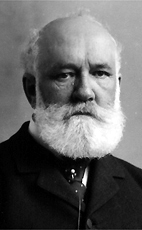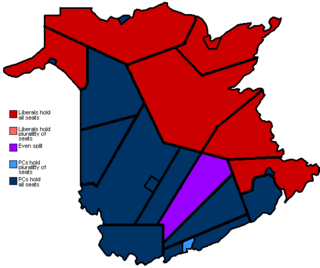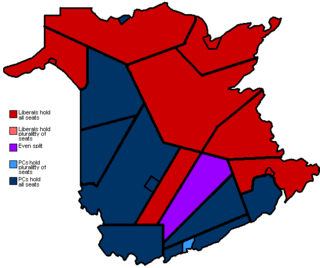This article needs additional citations for verification .(January 2016) (Learn how and when to remove this template message) |

The 25th New Brunswick general election was held on April 22, 1963, to elect 52 members to the 45th New Brunswick Legislative Assembly, the governing house of the province of New Brunswick, Canada.

The provinces and territories of Canada are sub-national governments within the geographical areas of Canada under the authority of the Canadian Constitution. In the 1867 Canadian Confederation, three provinces of British North America—New Brunswick, Nova Scotia, and the Province of Canada —were united to form a federated colony, becoming a sovereign nation in the next century. Over its history, Canada's international borders have changed several times, and the country has grown from the original four provinces to the current ten provinces and three territories. Together, the provinces and territories make up the world's second-largest country by area.

New Brunswick is one of four Atlantic provinces on the east coast of Canada. According to the Constitution of Canada, New Brunswick is the only bilingual province. About two thirds of the population declare themselves anglophones and a third francophones. One third of the population describes themselves as bilingual. Atypically for Canada, only about half of the population lives in urban areas, mostly in Greater Moncton, Greater Saint John and the capital Fredericton.

Canada is a country in the northern part of North America. Its ten provinces and three territories extend from the Atlantic to the Pacific and northward into the Arctic Ocean, covering 9.98 million square kilometres, making it the world's second-largest country by total area. Canada's southern border with the United States, stretching some 8,891 kilometres (5,525 mi), is the world's longest bi-national land border. Its capital is Ottawa, and its three largest metropolitan areas are Toronto, Montreal, and Vancouver. As a whole, Canada is sparsely populated, the majority of its land area being dominated by forest and tundra. Consequently, its population is highly urbanized, with over 80 percent of its inhabitants concentrated in large and medium-sized cities, with 70% of citizens residing within 100 kilometres (62 mi) of the southern border. Canada's climate varies widely across its vast area, ranging from arctic weather in the north, to hot summers in the southern regions, with four distinct seasons.
The election was called by surprise by Liberal Premier Louis Robichaud. The Progressive Conservatives, under leader Cy Sherwood, had accused the Liberals of corruption for allowing an Italian company, Cartiere del Timavo, to construct a paper mill in Newcastle, and grant it rights to Crown land over other companies. The Tories also claimed that Lieutenant-Governor Leonard O'Brien had sold land to the company. Robichaud made a quick decision to call an election amidst these accusations.

The New Brunswick Liberal Association, more popularly known as the New Brunswick Liberal Party or Liberal Party of New Brunswick, is one of the two major provincial political parties in New Brunswick, Canada. The party descended from both the Confederation Party and the Anti-Confederation Party whose members split into left-wing and right-wing groups following the creation of Canada as a nation in 1867.
Louis Joseph Robichaud,, popularly known as "Little Louis" or "P'tit-Louis", was the second Acadian Premier of New Brunswick, serving from 1960 to 1970.

The Progressive Conservative Party of New Brunswick is a centre-right, conservative political party in the Canadian province of New Brunswick. The party has its origins in the pre-Canadian confederation Conservative Party that opposed the granting of responsible government to the colony. It has historically followed the Red Tory tradition. The Progressive Conservative Party currently leads the provincial government since 2018 under Premier Blaine Higgs.
Analysts had wondered why Robichaud decided to call the election only two and a half years into his mandate over what they thought was a small issue. Several of his projects, such as tax reform and an overhaul of post-secondary education (which eventually led to the creation of the Université de Moncton and the University of New Brunswick at Saint John), died in the legislature. However, Robichaud later said that he held the election when his popularity was at its height and the Conservatives were weak.
The Université de Moncton is a French-language university located in Edmundston, Moncton and Shippagan, New Brunswick, Canada serving the Acadian community of Atlantic Canada. It is the only francophone university in New Brunswick and is one of only two such universities in the Maritimes, the other being the Université Sainte-Anne in Pointe-de-l'Église, Nova Scotia, Canada. It is also the largest French-language university in Canada outside Quebec.
Robichaud campaigned on a platform of economic development and encouragement of outside investment in the province. Cartiere del Timavo threatened to cancel the project if the Liberals lost the election. Many voters perceived Sherwood as too timid in his attacks on the Liberals on the campaign trail, as compared to his vigorous speeches in the Legislature.
The campaign coincided with a federal election, which was held two weeks earlier. That election saw the Conservatives of John Diefenbaker defeated by the Liberals of Lester Pearson. Robichaud then used the Liberal victory nationally as leverage provincially, promising New Brunswick would receive better treatment from the federal government with the same party in power.

John George Diefenbaker was the 13th prime minister of Canada, serving from June 21, 1957 to April 22, 1963. He was the only Progressive Conservative party leader after 1930 and before 1979 to lead the party to an election victory, doing so three times, although only once with a majority of seats in the House of Commons of Canada.
On election day, the Liberals were re-elected with an increased majority of one seat over the 1960 election.
| New Brunswick general election, 1963 | |||
|---|---|---|---|
| Party | Leader | Seats | Pop Vote |
| New Brunswick Liberal Association | Louis Robichaud | 32 | 51.8% |
| Progressive Conservative Party of New Brunswick | Cyril Sherwood | 20 | 48.2% |









